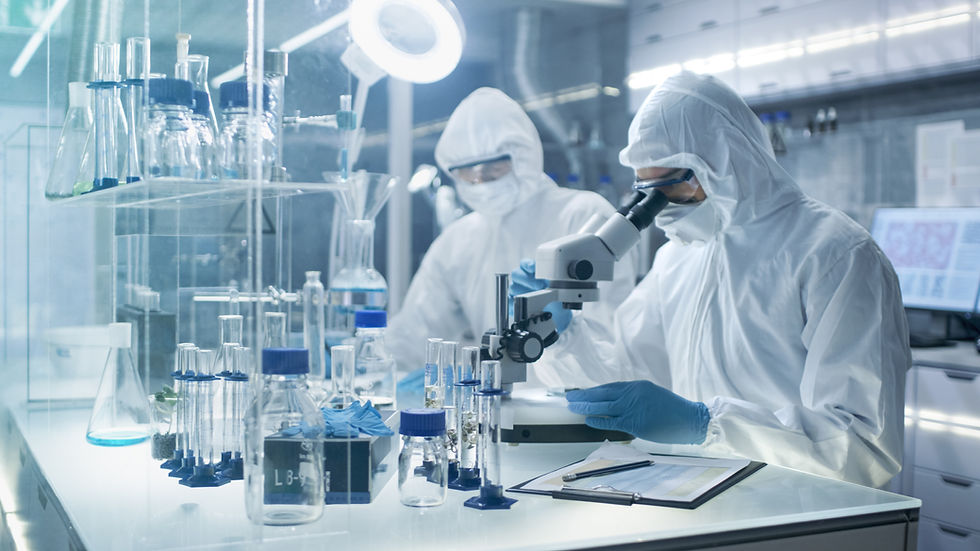Microscopes, Mistakes, and Mastery: 5 Lab Takeaways
- Jul 6, 2025
- 3 min read
Lab sessions always made me nervous at first—mainly because I was not too confident with my hands. I struggled with techniques that others seemed to do effortlessly. Many of my classmates produced better results, and I often found myself learning just by watching them work. But over time, with training, patience, and consistent practice, I developed the ability to work with precision and care. My lab experiences across microbiology, biotechnology, the blood bank, and time spent working under research scholars taught me far more than just protocols. They taught me discipline, teamwork, and how to observe, adapt, and grow.

While mastering techniques and learning protocols were important in my microbiology and biotech labs, there were deeper lessons that shaped how I think, work, and observe the world around me. Here are five powerful lessons that left a lasting impact on me:
1. Patience Is Everything—and So Is Learning from Failure
Lab work is rarely smooth the first time. Whether it was a PCR reaction that didn’t amplify, a contaminated culture, or a gel that ran the wrong way, failure was a frequent (and humbling) part of the process. But over time, I learned that failure in science is not the end—it’s data. Every error taught me something about the technique, the materials, or myself. I learned to troubleshoot, adjust protocols, and try again. In a world obsessed with speed, the lab taught me that science rewards those who are patient, curious, and willing to repeat until it works.

2. Keen Observation and Curiosity Are Your Best Tools
In a micro lab, details are everything. I quickly learned to notice the subtle differences—whether a colony was shiny or rough, whether a Gram stain revealed cocci or rods, or whether a DNA band was faint or sharp on a gel. These small observations can mean big differences in diagnosis or discovery. But what made the experience even more enriching was curiosity. I started asking questions: Why did this happen? What could have caused that? That mindset transformed the lab from a task to a treasure hunt, making me more engaged, alert, and excited to learn.

3. Microbes Are Awestriking, Always
The invisible world of microbes continues to amaze me. Seeing how a few bacteria could multiply into millions in just hours, or how different they look under a microscope, felt like watching nature’s hidden magic show. Each culture plate was like its own ecosystem, full of surprises. Some microbes help us make yogurt or antibiotics, while others can cause deadly diseases—yet they are all part of the same microbial kingdom. This balance between helpful and harmful is what makes microbiology endlessly fascinating.

4. Antibiotic Resistance Is Real—And Alarming
One of the most eye-opening moments was doing the Kirby-Bauer test for antibiotic sensitivity. Watching how certain bacteria weren’t affected by common antibiotics showed me, in real time, how serious antibiotic resistance has become. It’s one thing to read about it in textbooks, but to see resistant bacteria growing right up to an antibiotic disc was a different experience. It made me realize how fragile our medical tools are and how urgently we need innovation and responsible use. This experience deepened my interest in healthcare and drug development.

5. Every Sample Matters
In the lab, it’s easy to get caught up in procedures and forget the bigger picture—but one of the most powerful lessons I learned is that every sample matters. Whether it’s a blood sample in a hospital setting, a bacterial culture for research, or a DNA extract in a biotech lab, each one represents something real: a patient waiting for a diagnosis, a researcher testing a hypothesis, or a breakthrough in progress. Handling each sample with care, precision, and respect isn't just about good lab practice—it’s about honoring the trust and purpose behind it. This mindset shifted how I approached every task, reminding me that science, at its core, is meant to serve life.

These lessons from the lab were not part of any textbook—they were personal, real, and powerful. Whether you are a student stepping into your first lab or someone curious about science, remember: the lab doesn’t just teach techniques—it teaches resilience, observation, humility, and wonder.




Comments